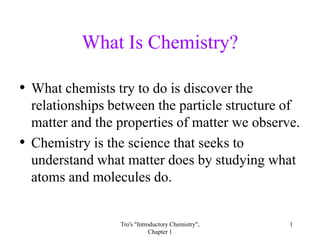
Tro3 lecture 01[1]
- 1. Tro's "Introductory Chemistry", Chapter 1 1 What Is Chemistry? What chemists try to do is discover the relationships between the particle structure of matter and the properties of matter we observe. Chemistry is the science that seeks to understand what matter does by studying what atoms and molecules do.
- 2. Tro's "Introductory Chemistry", Chapter 1 2 The Scientific Method A process for trying to understand nature by observing nature and the way it behaves, and by conducting experiments to test our ideas. Key characteristics of the scientific method include Observation, formulation of Hypotheses, Experimentation, and formulation of Laws and Theories.
- 3. Tro's "Introductory Chemistry", Chapter 1 3 Hypothesis A tentative interpretation or explanation of your observations. “The sweet taste of soda pop is due to the presence of sugar.” A good hypothesis is one that can be tested to be proven wrong. Falsifiable. One test may invalidate your hypothesis.
- 4. Tro's "Introductory Chemistry", Chapter 1 4 Experiments Tests of hypotheses, laws, or theories. Can you think of a way to test whether the sweet taste of soda pop is due to the presence of sugar? Results either validate (confirm) or invalidate (deny) your ideas. Invalidate = Discard or Modify Many times experiments invalidate only parts of the hypothesis or theory, in which case the idea is modified. Validate ≠ Proof your idea will always hold
- 5. Tro's "Introductory Chemistry", Chapter 1 5 Laws Summary of observations that combines all past observations into one general statement. Law of Conservation of Mass— “In a chemical reaction matter is neither created nor destroyed.” Allows you to predict future observations. So you can test the law with experiments. Unlike state laws, you cannot choose to violate a scientific law.